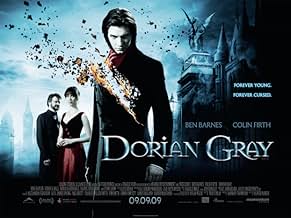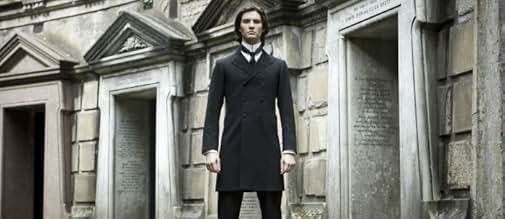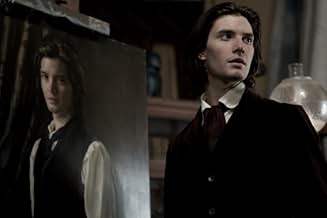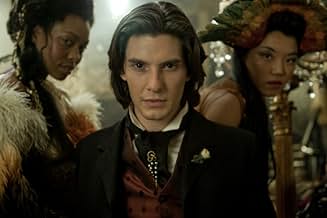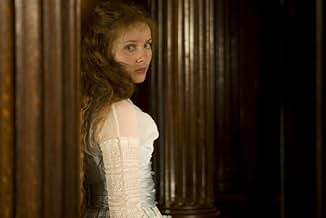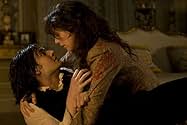VALUTAZIONE IMDb
6,2/10
69.993
LA TUA VALUTAZIONE
Un giovane dissoluto riesce in qualche modo a mantenere la sua bellezza giovanile per l'eternità, ma un ritratto speciale rivela gradualmente la bruttezza che si cela nel suo animo.Un giovane dissoluto riesce in qualche modo a mantenere la sua bellezza giovanile per l'eternità, ma un ritratto speciale rivela gradualmente la bruttezza che si cela nel suo animo.Un giovane dissoluto riesce in qualche modo a mantenere la sua bellezza giovanile per l'eternità, ma un ritratto speciale rivela gradualmente la bruttezza che si cela nel suo animo.
- Regia
- Sceneggiatura
- Star
- Premi
- 1 candidatura in totale
Jeff Lipman
- Lord Kelso
- (as Jeffrey Lipman Snr)
Recensioni in evidenza
I've been puzzled by the negative reviews i've seen for this as i really enjoyed it. It looks superb, with some excellent atmospheric Victorian locations. Ben Barnes is perfect as Dorian, good looking but not bland & still sympathetic throughout the film. The character of Emily which has been invented for the film works very well, and Colin Firth is magnificent in his pivotal role. Dorians gradual deprivation is well shown without heading off into exploitation and he is given real depth. His tragedy is very obvious.I must admit to not having read the original book as yet, but I do intend to now. I really enjoyed it but for its full benefit I recommend seeing it at the cinema.
It is obvious, the novel is only a pretext for a kind puzzle game with crumbs from Portrait of Dorian Gray. Maybe not so bad if you ignore the book. But if not, the only compensation can be the effort of Colin Firth and Ben Chaplin.
Ben Barnes ? Hansome, off course but, unfortunatelly, not Dorian. The exercises of exploration of Dorian gray past are only good intentioned.
In short, not a bad film but sort of childish exploration of a lot of ifs only for surprise or impress or seduce or be, apparently, cool.
But, not exactly Oscar Wild and, for me, it is not happy option.
Sure, new century, new states. But Portrait of Dorian Gray is more than thriller/ horror/ Gothic. Or , exactly the deep subtance, in this adaptation, just missing.
Ben Barnes ? Hansome, off course but, unfortunatelly, not Dorian. The exercises of exploration of Dorian gray past are only good intentioned.
In short, not a bad film but sort of childish exploration of a lot of ifs only for surprise or impress or seduce or be, apparently, cool.
But, not exactly Oscar Wild and, for me, it is not happy option.
Sure, new century, new states. But Portrait of Dorian Gray is more than thriller/ horror/ Gothic. Or , exactly the deep subtance, in this adaptation, just missing.
'Dorian Gray', directed by Oliver Parker, is definitely a more graphic adaptation of the spirit of the book written by Oscar Wilde. Throughout, I wondered how Wilde would react to the film, were he still with us. On one hand, I believe he would have appreciated the touch of horror; I certainly felt it in his writing. He was quoted from another of his books (Lady Windermere's Fan) "In this world there are only two tragedies. One is not getting what one wants, and the other is getting it." In this movie, the latter was certainly true for poor Dorian.
On the other hand, the book 'Picture of Dorian Gray' seemed fairly minimalist in affect (as was Barnes' interpretation of the character) so, would Mr. Wilde be a smidge put off by all the melodrama and overt sexual content? Who knows? He used a lot of symbolism and subtle innuendo in his writing, but the politics of the time could account for some of what he didn't literally spell out, I suppose. After all, he was imprisoned for his lifestyle and beliefs, for a time.
Wilde lived a deep and complicated life. His personality and character were revealed through his writing and oh, what I would have given to be on his list of friends. "A good friend will stab you in the front." -- Oscar Wilde
Alas, the book, in this case, pleased my pitiful imagination more than the movie. While the acting was superb, I had a difficult time reconciling myself with what I felt was an over-reach on the tenor of this great story. You know, the old 'less is more' adage.
My disclaimer to the literary elite: I am simply an appreciator of art, not a professional, so take my opinion with a grain of whatever you prefer.
"I don't say we all ought to misbehave, but we all ought to look as if we could." -- Oscar Wilde
On the other hand, the book 'Picture of Dorian Gray' seemed fairly minimalist in affect (as was Barnes' interpretation of the character) so, would Mr. Wilde be a smidge put off by all the melodrama and overt sexual content? Who knows? He used a lot of symbolism and subtle innuendo in his writing, but the politics of the time could account for some of what he didn't literally spell out, I suppose. After all, he was imprisoned for his lifestyle and beliefs, for a time.
Wilde lived a deep and complicated life. His personality and character were revealed through his writing and oh, what I would have given to be on his list of friends. "A good friend will stab you in the front." -- Oscar Wilde
Alas, the book, in this case, pleased my pitiful imagination more than the movie. While the acting was superb, I had a difficult time reconciling myself with what I felt was an over-reach on the tenor of this great story. You know, the old 'less is more' adage.
My disclaimer to the literary elite: I am simply an appreciator of art, not a professional, so take my opinion with a grain of whatever you prefer.
"I don't say we all ought to misbehave, but we all ought to look as if we could." -- Oscar Wilde
The darkly amoral Oscar Wilde novel "The Picture of Dorian Gray" is one of my favourites and naturally lends itself to both theatrical and cinematic dramatisations with its gripping story-line and sharply-drawn characters. This latest adaptation takes some liberties with the story-line in giving a possible reason for Dorian Gray's headlong dive into hedonism in the form of a bullying father who locked and beat his young self in the attic where he's forced to hide the offending portrait, introduces Henry Wotton's daughter as a love interest and moves the action on in time to the First World War, although the source is so strong, I don't think it needs embellishment.
The Gothic element in the story is frankly maxed out as Doran descends the slippery slope to corruption, in short order corrupting a young actress who falls in love with him, deflowering a young virgin at her coming-out ball (and her mother too!) indulge in a homosexual act with his artist friend, before bottoming out with outright murder. These scenes are lurid in their depiction and justifiable I suppose in demonstrating the levels of depravity Doran Gray has sunk to. Less convincing for me in particular were the back- story of his troubled childhood as it weakened the influence on his character of the Machiavellian all-talk-no-action Henry Wooton character plus I think the action should have been contained within the Late Victorian London era, even allowing for Dorian's ageing.
All the British cast acquit themselves admirable, Ben Barnes very good as the eternally young devil-may-care Dorian, Ben Chaplin, fine as the doomed artist Basil and especially Colin Firth as Wooton, who initially inspires and encourages Dorian's increasingly heartless actions but who realises in the end the monster behind the facade that he as helped foster.
The key climactic scene where Dorian confronts his own self-image is excitingly done and indeed the film plays like a thriller in terms of pace.
In general though I think the director placed too many logs on the fire and sacrificed narrative flow and character motive in so doing, but at least the film was exciting and always trying to move forward, the London exteriors of the 1890 in particular
The Gothic element in the story is frankly maxed out as Doran descends the slippery slope to corruption, in short order corrupting a young actress who falls in love with him, deflowering a young virgin at her coming-out ball (and her mother too!) indulge in a homosexual act with his artist friend, before bottoming out with outright murder. These scenes are lurid in their depiction and justifiable I suppose in demonstrating the levels of depravity Doran Gray has sunk to. Less convincing for me in particular were the back- story of his troubled childhood as it weakened the influence on his character of the Machiavellian all-talk-no-action Henry Wooton character plus I think the action should have been contained within the Late Victorian London era, even allowing for Dorian's ageing.
All the British cast acquit themselves admirable, Ben Barnes very good as the eternally young devil-may-care Dorian, Ben Chaplin, fine as the doomed artist Basil and especially Colin Firth as Wooton, who initially inspires and encourages Dorian's increasingly heartless actions but who realises in the end the monster behind the facade that he as helped foster.
The key climactic scene where Dorian confronts his own self-image is excitingly done and indeed the film plays like a thriller in terms of pace.
In general though I think the director placed too many logs on the fire and sacrificed narrative flow and character motive in so doing, but at least the film was exciting and always trying to move forward, the London exteriors of the 1890 in particular
The Picture of Dorian Gray, as penned by the Irish wit Oscar Wilde (1854 - 1900), is a tale of high-brow debauchery and limitless pleasures of body and soul and the corruption, by one Lord Henry Wotton, of the young, handsome and soon to be narcissistic 19th century rock 'n roll hell-raiser Dorian Gray.
Ealing Studios have translated Wilde's controversial novel into a celluloid den of iniquity that somehow comes across as rather shallow. Like the characters seen here too; it seems that as a work of symbolic gesture of how the upper classes conduct their sordid lifestyle of hypocrisy, deceit and lust it lacks any deep and thoughtful intrigue that any good 19th century Gothic horror story should be.
To fully understand the ethics of a Victorian London that Oscar Wilde has so wonderfully reflected with his novel here, we see, too, with this latest interpretation using, as Wilde may have done, the picture purely as a metaphorical means. Yes, we see the selling of souls here and the lamb to the slaughter and the hedonistic teachings of Lord Wotton, but toward the end, the whole sordid affair becomes predictable.
Penned with an undercurrent of realism and too fantasy of the love of sin. It's a dark, dirty, dingy setting of a self-indulgent Victorian London that we are lead to believe is prim and proper on the surface but lurking just below this weak, temperate society lies pure greed, greed for experience, experience that will transcend the mind, body and soul to the wondrous dealings of what life has to offer. For, as always, a price, a price both Oscar Wilde and Dorian Gray would pay the highest sacrifice.
It is with a taint of sorrow that this latest performance too has paid a price too high, sensationalism over content, ironies aside, the film seems too concerned to show the sordid details of this lifestyle and its inhabitants'. It lingers on too far in the bedrooms of London and strays too far from the mental anguish that may have been. We see the trouble mind of our young (looking) man but we see not enough of his fears, regrets, sorrows and repentance, which are cast aside and squandered. Welcome to the 21st century Mr. Wilde.
By the time the chimes of time are echoing in the distance we have Dorian fading into the far reaches of the eternal abyss of the afterlife. With all the time in the world we are still wanting more to feed our palates, it's all to aesthetically pleasing, but at the same time oh so unrewarding, a taster we are given but the full flavour we are, regrettably, spared.
This too may have its target audience and in so having picked its target out it may have trouble standing the test of time, due to its lack of wit, lack of diversity and a lack of daring and commitment of its original source. It is a sad loss that such a literary work of historical meaning and wealth should have been robbed of its qualities.
Ealing Studios have translated Wilde's controversial novel into a celluloid den of iniquity that somehow comes across as rather shallow. Like the characters seen here too; it seems that as a work of symbolic gesture of how the upper classes conduct their sordid lifestyle of hypocrisy, deceit and lust it lacks any deep and thoughtful intrigue that any good 19th century Gothic horror story should be.
To fully understand the ethics of a Victorian London that Oscar Wilde has so wonderfully reflected with his novel here, we see, too, with this latest interpretation using, as Wilde may have done, the picture purely as a metaphorical means. Yes, we see the selling of souls here and the lamb to the slaughter and the hedonistic teachings of Lord Wotton, but toward the end, the whole sordid affair becomes predictable.
Penned with an undercurrent of realism and too fantasy of the love of sin. It's a dark, dirty, dingy setting of a self-indulgent Victorian London that we are lead to believe is prim and proper on the surface but lurking just below this weak, temperate society lies pure greed, greed for experience, experience that will transcend the mind, body and soul to the wondrous dealings of what life has to offer. For, as always, a price, a price both Oscar Wilde and Dorian Gray would pay the highest sacrifice.
It is with a taint of sorrow that this latest performance too has paid a price too high, sensationalism over content, ironies aside, the film seems too concerned to show the sordid details of this lifestyle and its inhabitants'. It lingers on too far in the bedrooms of London and strays too far from the mental anguish that may have been. We see the trouble mind of our young (looking) man but we see not enough of his fears, regrets, sorrows and repentance, which are cast aside and squandered. Welcome to the 21st century Mr. Wilde.
By the time the chimes of time are echoing in the distance we have Dorian fading into the far reaches of the eternal abyss of the afterlife. With all the time in the world we are still wanting more to feed our palates, it's all to aesthetically pleasing, but at the same time oh so unrewarding, a taster we are given but the full flavour we are, regrettably, spared.
This too may have its target audience and in so having picked its target out it may have trouble standing the test of time, due to its lack of wit, lack of diversity and a lack of daring and commitment of its original source. It is a sad loss that such a literary work of historical meaning and wealth should have been robbed of its qualities.
Lo sapevi?
- QuizThe original Dorian Gray has blond curly hair and blue eyes.
- BlooperWhen Dorian is fighting Jim in the train station tunnel, the sleepers and spikes are visible. The spikes seen were not in use in 1890 when the novel was written, nor the era when the film is set.
- Citazioni
Lord Henry Wotton: There's no shame in pleasure. Man just wants to be happy. But society wants him to be good. And when he's good, he's rarely happy. But when he's happy, he's always good.
- Curiosità sui creditiAt the start of the closing credits, they fade in and out, alternating with images of the Portrait peeking through, as though it is trying to assert itself.
- Versioni alternativeDuring post-production, the film was tailored for a '15' certificate in the UK. According to the BBFC, the filmmaker cuts were as follows:
- A scene in which a tea party is inter-cut with shots showing Dorian's sadomasochistic excesses was toned down to remove or reduce the more explicit moments (explicit sight of a fingernail being pulled off, explicit sight of a chest being cut with a razor in a sexual context, explicit sight of blood being sucked from a woman's breasts and sight of a restrained man being beaten).
- Additionally, a murder scene was toned down to remove the sense of dwelling on the infliction of pain and injury (reduction in the number of stabbings, removal of a blood spurt from man's neck, reduction in sight of victim choking on his blood).
- ConnessioniFeatured in Lost in Adaptation: The Picture of Dorian Gray 2009 (2020)
I più visti
Accedi per valutare e creare un elenco di titoli salvati per ottenere consigli personalizzati
- How long is Dorian Gray?Powered by Alexa
- Is 'Dorian Gray' based on a book?
- What was the burning effigy Dorian sees as he wanders London after returning 25 years later?
- How does the movie end?
Dettagli
- Data di uscita
- Paese di origine
- Sito ufficiale
- Lingua
- Celebre anche come
- El retrato de Dorian Gray
- Luoghi delle riprese
- Aziende produttrici
- Vedi altri crediti dell’azienda su IMDbPro
Botteghino
- Lordo in tutto il mondo
- 22.873.653 USD
- Tempo di esecuzione1 ora 52 minuti
- Colore
- Mix di suoni
- Proporzioni
- 1.85 : 1
Contribuisci a questa pagina
Suggerisci una modifica o aggiungi i contenuti mancanti





